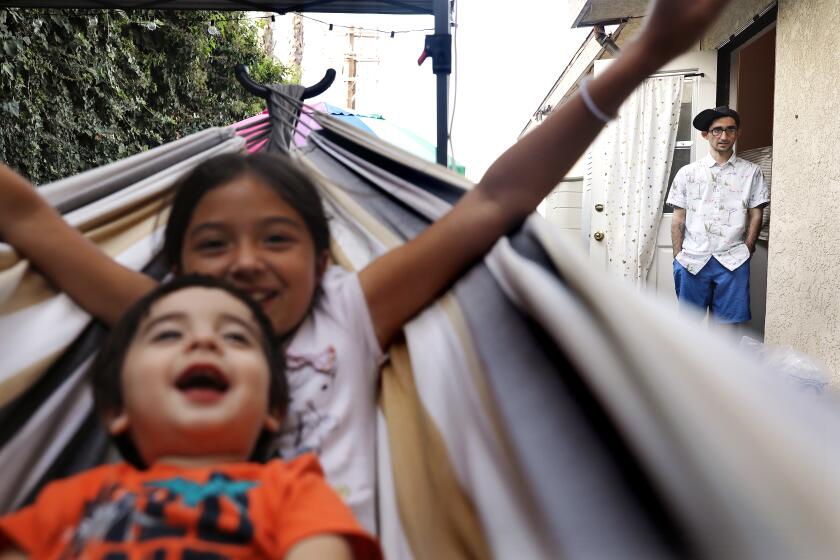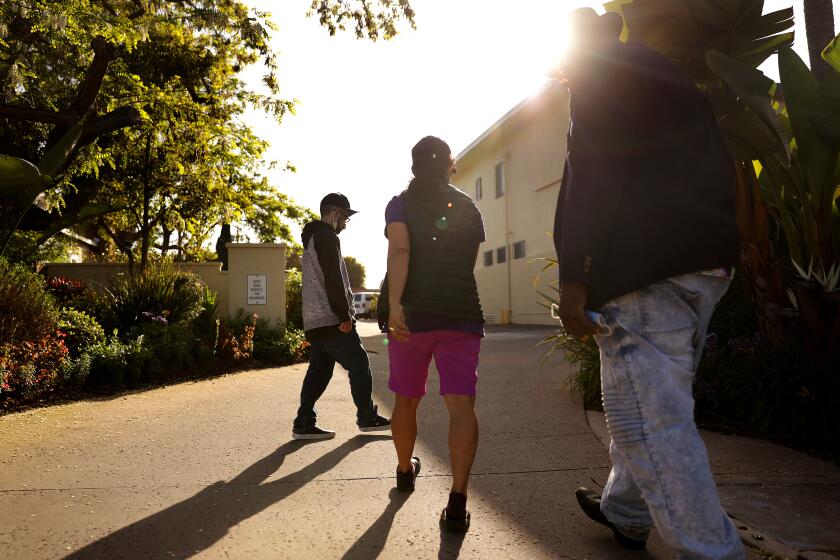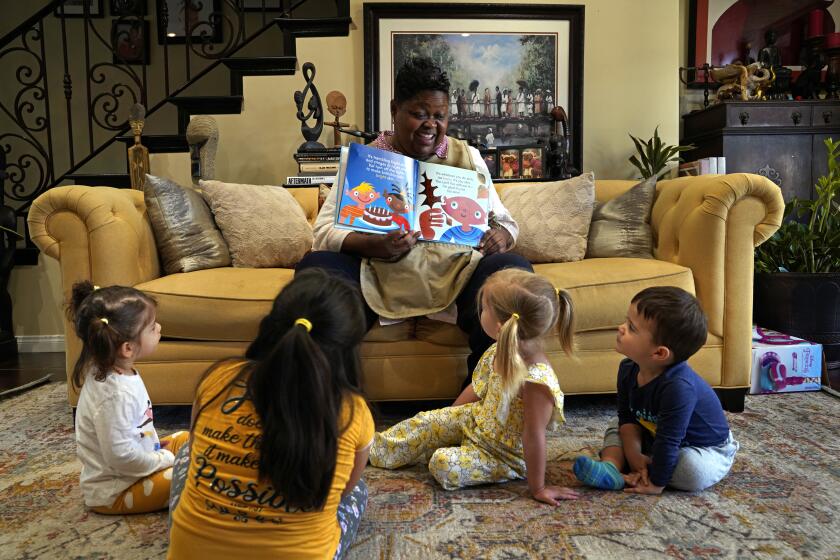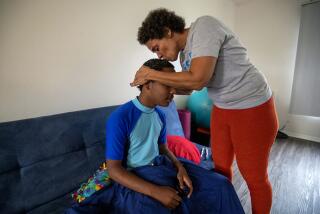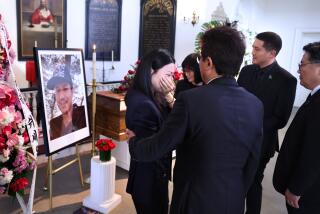Schizophrenia is a black box. How — and why — we reported Anthony’s story
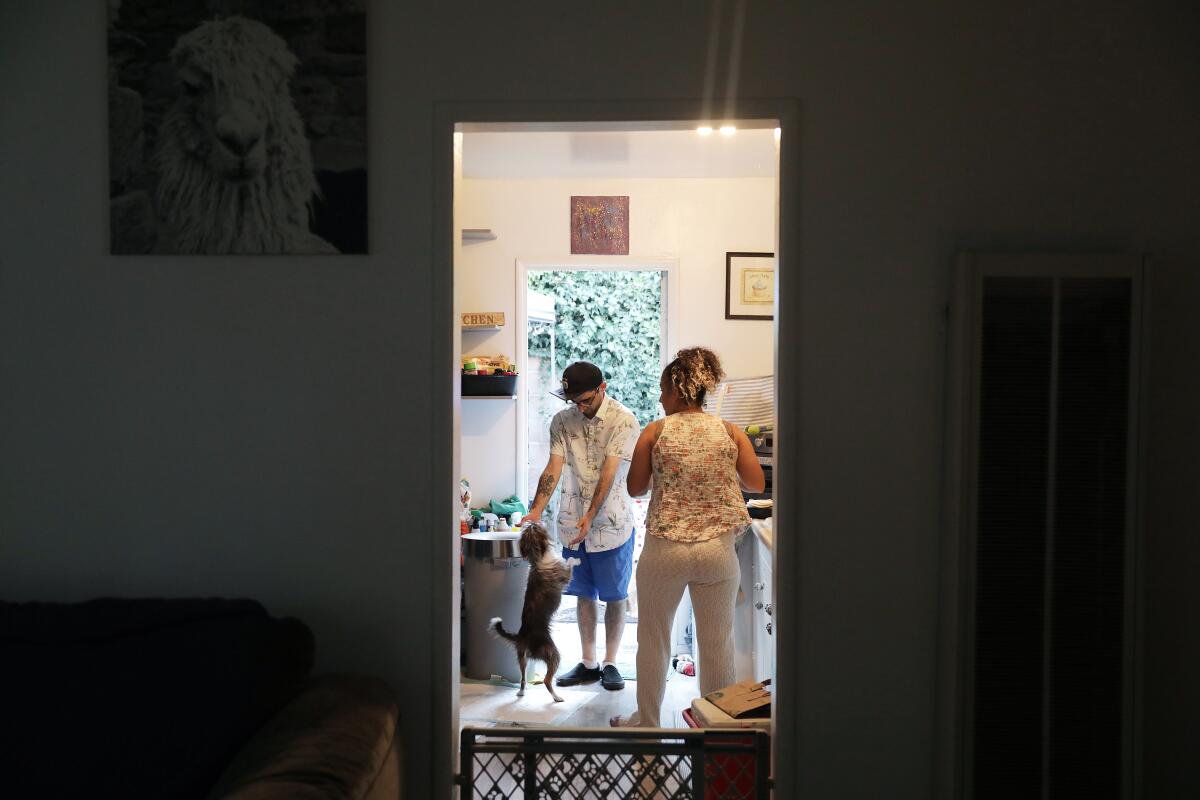
- Share via
One cool spring afternoon, Anthony Mazzucca and his mother, Mary Liciaga, stopped into a Starbucks in Marina del Rey. They had just come from an Alcoholics Anonymous meeting, and Mary had promised her son a coffee.
Standing at the counter, Anthony asked for medium roast and a coconut lemon bar. Mary reminded him to make it a decaf. His voice was soft, and as always, he was polite. Waiting for his order, he moved to the side. Standing alone, he began talking to himself, quietly muttering and occasionally gesturing.
If customers noticed, they didn’t seem concerned. His posture slightly hunched over, Anthony seemed shy and withdrawn, not likely to be trouble or a nuisance for anyone. His words were indistinguishable, but his expression was absorbed and intent.
If you were to ask him whom he’s talking to, he’ll tell you. Often he’s in conversation with the Maker of All and with God (they’re not the same). He’s negotiating for power, and I could only assume they drive a hard bargain. He once told me it would cost him $410.
I met Anthony in March, but I have known his mother since 2018, when I wrote about the efforts of state legislators to strengthen the law allowing for involuntary hospitalization of people who are gravely disabled or a danger to themselves or others.
Mary called me at The Times, introduced herself and told me that her son has schizophrenia, was living on the street in Compton, and she wanted to help him. I contacted an outreach worker with a homeless services agency who met Anthony and reported that he didn’t want to go into treatment. A few weeks later, L.A. County sheriff’s deputies took him to Harbor-UCLA Medical Center.
“… patient was irritable, disorganized, laughing inappropriately, making clicking sounds, with bizarre gestures (i.e. hitting himself on the chest and abdomen, raising his hand in martial-art-like gesture) which appeared volitional,” wrote the attending psychiatrist.
In the weeks that followed, with the help of antipsychotic medications, Anthony calmed down, and Mary texted me updates. She eventually got him into a locked residential facility, and we continued to keep in touch.
I was impressed by Mary’s commitment to her son. Severe mental illnesses often break families apart, especially those that cannot afford private treatment, but Mary didn’t turn her back on him. I sensed complicated motivations — a mother’s love and guilt, denial that he was as sick as he was, hope that he could get better, and indignation that more help wasn’t available — but none of that mattered.
Anthony needed an advocate, which is why Mary had become his conservator in 2017. She had seen how close he had come to dying on the streets or getting lost in the jail system.
Earlier this year, Gov. Gavin Newsom laid out a proposal to compel people with severe mental illness and addictions into court-ordered care, medication and housing, and I thought Anthony’s story would illustrate how difficult this would be, especially in the long run.
Mary and Anthony agreed to share their story and to help me track down his medical records from facilities across the county. Throughout the spring, Times photographer Christina House and I joined them on their weekly outings.
Read the story
The life of a 31-year-old living with schizophrenia illustrates the toll of illness and the challenge of getting severely mentally ill people off the streets.
Anthony spoke a lot about himself, blending real and fantastical stories. He is imaginative and often poetic, making up words to capture the strange and private worlds that he has occupied for nearly 10 years. “These are adult matters,” he told me. “Nothing kitschy here.”
He is an inventor who has accomplished a lot in the last “temeculon” — 100 years “in condensed time.” Using “landscaping devices” (his hands), he made heaven and hell, the movies “The Texas Chainsaw Massacre” and “The Matrix,” some boats, a few books (“Book of Life” and “Book of Death”) and “the Gizzard,” a reptilian sea creature.
As reserved as he is, he is also confident in what he knows, and the breadth of his mind, evidenced either by his language or hallucinations, is always on display. He is also exceedingly courteous. When I asked why he has this gift to see and hear this invisible world, he was quick to answer.
“It’s a good question. It’s my intelligence,” he said. “I’m very smart. I’m a mathematician by hobby. I coagulate differences between America and other countries. I understand things about the Mafia and simple daily living.”
Packed with allusions, references, random associations and wordplay, Anthony’s answers to my questions were illustrative of schizophrenia with its steady, unfiltered bombardment of information, real and unreal, that he struggles to organize.
A mental institution in Mar Vista, built originally as a developer’s home, spans the modern history of West Los Angeles and the region’s halting efforts to house the mentally ill.
Listening to him, I came to understand why he is so busy negotiating power with the Maker or occasionally needing to turn in a circle a few times before sitting down: whatever it takes to find a little peace amid the chaos inside and around him.
But this is a guess. Schizophrenia is a black box — no seeing inside — and although the diagnosis comes with a formal description (“delusions, hallucinations, disorganized speech, disorganize catatonic behavior, negative symptoms”), what I saw in Anthony in the course of our visits was more familiar: funny, smart, nervous, afraid, embarrassed, perhaps even frustrated.
As he waited for his coffee and ate his coconut lemon bar, I wondered what assumptions I would make if I met him for the first time and didn’t know he had schizophrenia.
Dispense with the label, and we all fall on a spectrum measuring degrees of mental illness and mental health. Some of us just need more help navigating a world that is scary, complicated and overwhelming.
A list of crisis hotlines, low-fee and sliding scale counseling, support groups, and mindfulness and meditation services
More to Read
Sign up for Essential California
The most important California stories and recommendations in your inbox every morning.
You may occasionally receive promotional content from the Los Angeles Times.
